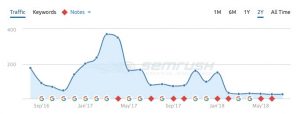
We’re all doing business in a digital world.
Even if you run a brick and mortar store with no website, customers are still discovering you and telling people about you in digital channels (whether you like it or not).
This means your online presence and reputation is just as important as your physical one — maybe even more so.
A vast majority of the people who interact with your business probably do so online as well as in person.
And this trend is only increasing as the population becomes more adept at navigating online information sources.
This has lead to some interesting and profound changes in how we do business.
One aspect in particular, in my opinion, is dying a quick death:
The business card.
Why The Business Card is Dying

Business cards used to have a distinct and important purpose in the world.
They served to tell us the business’s name, what it does (briefly), and contact and/or location information.
They were great for keeping this information handy so it could be accessed when needed.
However, an extremely disruptive force of technology has evolved to do this infinitely better than a business card ever could:
Google.
Google search results do exactly what business cards used to.
They tell you who the business is, what it does, who it does it for, how to get in contact, and where it’s located.
You can even get directions or call it immediately with the click of a button.
Except, this business card can be accessed anywhere, any time, and by anyone with an internet connection.
It has also evolved into the natural first place prospects turn to when they want to learn more about a business.
Not the Yellow Pages or digging through their wallet for a ripped, worn-out piece of paper they received 2 months ago.
Your Google search result has replaced your business card, and whether you’ve noticed it or not, this is having profound effects on your customer’s perception of you.
How Your Google Search Results Affect Potential Buyers
Even if a potential customer hears about you through word of mouth (whether it’s positive or negative) they will search for you on Google to find out more.
What shows up either aids or detracts from their impression of you.
And this impression isn’t solely affected by reviews like these:

It’s what’s in your tagline, meta description, images, and the other structured data Google displays:

If your search result doesn’t look clear and professional, this is like handing every potential customer you meet a bland, unorganized business card.
What’s worse, is they can immediately see the other “business cards” (i.e. search results) next to you and compare their options.
If those business cards are clear, professional, and attractive, prospects will weigh them against you more heavily.
Here are a few tips for improving your Google search result:
- Make sure your business’s name and what you do is clearly displayed in the SEO title. For example, “Mystic Massage – Massage Therapy Austin Texas” is a good title.
- Don’t include unnecessary words or phrases, like “Home Page” or “Click Here.”
- Describe your business in further detail within the meta description.
- Fill out all of the details in your Google My Business page, especially location, phone number, and operating hours.
Reviews of your business will also be prominently displayed.
If they’re below average, a prospect could quickly and easily find a competitor with better reviews (sometimes on the exact same page), despite first searching for you and you alone.
This isn’t an ideal spot to be in.
Thankfully, there are ways to improve your customer reviews, which we will discuss in a bit.
However, there is something far worse for your business than below average reviews or an unattractive search result…
Not Showing Up in Google at All
What’s worse than bad reviews or an ugly search result?
Not showing up at all!
If you don’t show up it’s an even bigger red flag than if your result gives off an unfavorable impression.
Not showing up sparks an instant flurry of questions in the customer’s mind:
- Why aren’t they showing up in Google?
- Is it worth my time to keep searching for more information about them?
- Here’s a similar business nearby! Should I just go with them instead?
Unfortunately, most small to medium-sized business owners do not understand how to get ranked in Google.
The ones who do end up on the first page (for the keywords they want to rank for) do so on accident.
The rest are left wondering why their competitors continue to grab a bigger slice of the market share.
So if you’re not showing up in Google, it should be your number one priority.
Once you’re showing up, that’s great, but it’s only step one in your customer’s sales journey…
Whether or Not to do Business With You?
If a customer’s interest is peaked, they won’t simply stop at your search result.
They will look at the first couple reviews posted on Google and then dig even further.
This survey found that 84% of people trust online reviews as much as a personal recommendation.
And 90% of consumers read less than 10 reviews before forming an opinion about a business.
Customers take reviews very seriously because the best way for them to get an idea of what it would be like to experience a business is from other people’s experiences with it.

Word-of-mouth is one of the strongest forms of marketing.
Reviews are the online version of this, so it’s imperative you take action to make sure your reviews are as positive as possible.
This can be achieved in two main ways:
- Provide an amazing service
- Use a review system that maximizes your positive reviews (and minimizes negative ones)
Hopefully, you have #1 handled.
Providing an amazing service will always garner positive ROI, both tangibly and intangibly.
If your service is lacking, there isn’t a review system in the world, other than buying fake reviews (not recommended), that could improve your rating.
However, if you provide a great service, setting up the following system could maximize your reviews:
A Review System To Maximize Positive Reviews (and Minimize Negative Ones)
First off, what’s a review system?
A review system is a step-by-step process to make it easy for customers to leave reviews about your business, whether it be on Google, Facebook, Yelp, or any of the other review websites.
However, here’s the important part:
It also helps maximize the number of positive reviews you get while slowly minimizing the negative ones.
To set up your review system, you first need a webpage to accept customer reviews.

You then encourage customers to leave reviews on this page after they have engaged with your business.
Make sure they can give you a rating of 1-5 stars (like most review websites offer).

Anyone who leaves a review of 3 stars or less is then asked for feedback about their experience.
Here, you ask for reasoning behind their review and what improvements they would have made.
This allows you to address negative reviews as quickly as possible and you get consistent feedback about your service.
This slowly minimizes your negative reviews as your service continually improves.
Anyone who leaves a review of 4 or 5 stars gets redirected to a page where they can leave a review on a multitude of review websites.
These people already view you in a favorable light, so making it easy for them to leave more positive reviews on other websites helps maximize your positive reviews.
Once set up, the success of this system is about getting as many people as possible to fill out a review on your webpage.
Here are a few ways to do it:
- Place notices within your store with instructions on how to leave a review
- Include links on your website that point to the review page
- Ask your social media followers to leave a review
- Automate an email to be sent after purchase
After this, your review system should be ready to go.
Moving Forward
Once you’re showing up in Google, your search result is clear and inviting, and your reviews are positive, you are ready to make your new digital business card work wonders for you.
The best part?
This all works in the background while you continue to man the front lines and handle the rest of your business.
However, organic search and online reviews are only a part of your online presence.
Showing up for your business name is just the start.
Showing up for what your prospects are searching for is the next step to help you get a leg up in an ever-growing field of competition.
Business & Finance Articles on Business 2 Community(89)
Report Post







